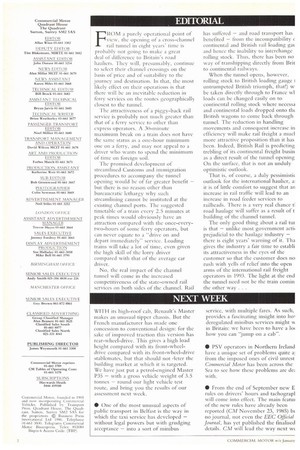F ROM a purely operational point of view, the opening of
Page 2

If you've noticed an error in this article please click here to report it so we can fix it.
a cross-channel rail tunnel in eight years' time is probably not going to make a great deal of difference to Britain's road hauliers. They will, presumably, continue to select their channel crossings on the basis of price and of suitability to the journey and destination. In that, the most likely effect on their operations is that there will be an inevitable reduction in ferry services on the routes geographically closest to the tunnel.
The attractiveness of a piggy-back rail service is probably not much greater than that of a ferry service to other than express operators. A 30-minute maximum break on a train does not have thc same status as a one-hour minimum One on a ferry, and may not appeal to a driver who wants to spend the minimum of time on foreign soil.
The promised development of streamlined Customs and immigration procedures to accompany the tunnel opening would be of far greater benefit but there is no reason other than bureaucratic lethargy why such streamlining cannot be instituted at the existing channel ports. The suggested timetable of a train every 2.5 minutes at peak times would obviously have an attraction compared with the once-everytwo-hours of some ferry operators, but can never equate to a "drive on and depart immediately" service. Loading trains will take a lot of time, even given the high skill of the lorry driver compared with that of the average car driver.
No, the real impact of the channel tunnel will conic in the increased competitiveness of the state-owned rail services on both sides of the channel. Rail has suffered — and road transport has benefited — from the incompatibility c continental and British rail loading gat and hence the inability to interchange rolling stock. Thus, there has been no way of transhipping directly from Brit to continental railways.
When the tunnel opens, however, rolling stock to British loading gauge I untrumpeted British triumph, that!) w be taken directly through to France wl loads can be changed easily on to continental rolling stock where necessa and continental loads dropped onto tht British wagons to come back through tunnel. The reduction in handling movements and consequent increase in efficiency will make rail freight a muck more attractive proposition than it has been. Indeed, British Rail is predicting trebling of its continental freight busin as a direct result of the tunnel opening On the surface, that is not an unduly optimistic outlook.
That is, of course, a duly pessimistic outlook for the international haulier, a: it is of little comfort to suggest that an increase in rail traffic will lead to an increase in road feeder services to railheads. There is a very real chance tl road haulage will suffer as a result of t building of the channel tunnel.
The only good thing about a rail tut is that — unlike most government acti■ prejudicial to the haulage industry — there is eight years' warning of it. Tha gives the industry a fair time to establi its attractiveness in the eyes of the customer so that the customer does no rush with yells of relief into the open arms of the international rail freight operators in 1993. The light at the end the tunnel need not he the train commn the other way .


























































